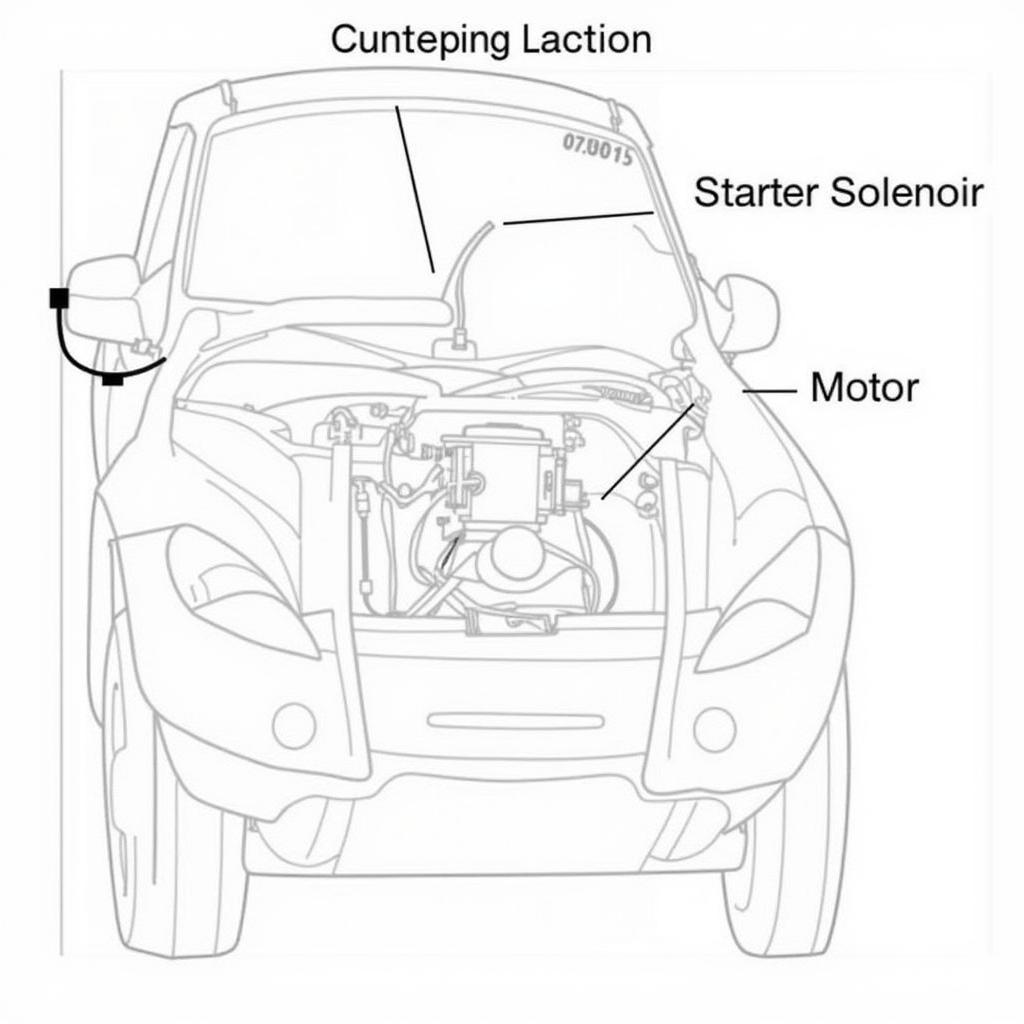Is your car refusing to start? A sputtering engine or a complete lack of response can be frustrating, especially when you’re in a hurry. Often, the culprit is either a bad battery or a bad starter. This article will guide you through diagnosing which component is causing your car trouble, empowering you with the knowledge to get back on the road quickly.
Identifying a Bad Battery
A dead battery is the most common reason for a car not starting. Signs of a bad battery can include:
- Dim headlights, especially when trying to start the engine.
- Slow cranking: The engine struggles to turn over or cranks very slowly.
- Clicking sound when turning the key: This indicates the starter is trying to engage but lacks sufficient power.
- Interior lights that are dim or don’t work at all.
- Problems with electrical accessories like the radio or power windows.
You can test your battery with a multimeter to determine its voltage. A healthy battery should read around 12.6 volts or higher. A reading below 12.2 volts suggests a failing battery.
Recognizing a Failing Starter
While a bad battery can mimic starter problems, there are distinct signs of a failing starter:
- A single loud click or a rapid series of clicks when you turn the key. This means the starter solenoid is engaging but the starter motor isn’t turning.
- Grinding noise when starting the engine: This suggests the starter gear isn’t meshing correctly with the flywheel.
- The engine cranks normally but doesn’t start: This could indicate a problem with the starter’s internal components.
- Smoke coming from the starter: This is a sign of a serious electrical problem within the starter and requires immediate attention.
 Car Starter Location and Identification
Car Starter Location and Identification
Testing and Troubleshooting
Sometimes, it can be difficult to differentiate between a bad battery and a bad starter. Here’s a simple trick: Try jump-starting your car. If the car starts with a jump start but then dies again shortly after, the problem is likely a bad battery. If the car doesn’t start even with a jump start, the issue likely lies with the starter.
“A common mistake people make is assuming a clicking noise always indicates a bad starter. It can often be a weak battery struggling to provide enough power,” says John Williams, Senior Automotive Electrical Technician at AutoTech Solutions.
Remote Diagnostics and Software Solutions
In today’s technologically advanced world, remote diagnostics and software solutions play a crucial role in pinpointing car problems. These tools allow technicians to access vehicle data remotely, diagnose issues, and even reprogram or update software without physical access to the car. This can save time and money, especially for intermittent problems that are difficult to reproduce in a shop.
“Remote diagnostics has revolutionized the way we troubleshoot and repair vehicles, enabling us to provide faster and more efficient service to our customers,” adds Maria Sanchez, Lead Software Engineer at Car Diagnostics Inc. This technology can help identify complex electrical issues, including those related to the starter and battery systems.
Conclusion
Determining whether you have a bad battery or bad starter can be challenging, but by following the steps outlined in this article, you can effectively diagnose the problem. Remember, paying attention to specific symptoms like dim lights, clicking sounds, or grinding noises can help pinpoint the culprit. Don’t hesitate to use a multimeter to test your battery voltage and consider the benefits of remote diagnostics. With a little troubleshooting, you can get your car back on the road in no time.
FAQ
-
Can a bad alternator cause similar symptoms? Yes, a failing alternator can prevent the battery from charging properly, leading to symptoms similar to a bad battery.
-
How long does a car battery typically last? Car batteries typically last between 3 and 5 years, depending on usage and climate.
-
Is it safe to jump-start a car with a dead battery? Yes, it’s generally safe, but follow proper jump-starting procedures to avoid damage.
-
How much does it cost to replace a car battery? The cost of a new car battery can vary depending on the type and size, typically ranging from $50 to $200.
-
How much does it cost to replace a starter? Starter replacement costs can range from $150 to $500, including parts and labor.
-
Can I replace a car battery or starter myself? Replacing a battery is a relatively simple DIY task, but replacing a starter can be more complex and may require professional assistance.
-
What should I do if my car still doesn’t start after replacing the battery or starter? If your car still doesn’t start, it’s best to consult a qualified mechanic for further diagnosis and repair.
